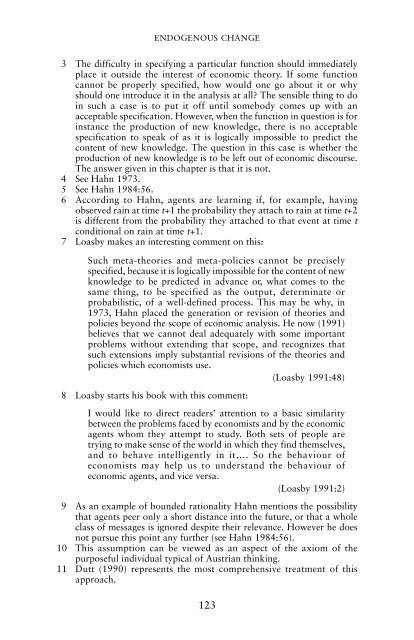Subjectivism and Economic Analysis: Essays in memory of Ludwig ...
Subjectivism and Economic Analysis: Essays in memory of Ludwig ...
Subjectivism and Economic Analysis: Essays in memory of Ludwig ...
Create successful ePaper yourself
Turn your PDF publications into a flip-book with our unique Google optimized e-Paper software.
ENDOGENOUS CHANGE3 The difficulty <strong>in</strong> specify<strong>in</strong>g a particular function should immediatelyplace it outside the <strong>in</strong>terest <strong>of</strong> economic theory. If some functioncannot be properly specified, how would one go about it or whyshould one <strong>in</strong>troduce it <strong>in</strong> the analysis at all? The sensible th<strong>in</strong>g to do<strong>in</strong> such a case is to put it <strong>of</strong>f until somebody comes up with anacceptable specification. However, when the function <strong>in</strong> question is for<strong>in</strong>stance the production <strong>of</strong> new knowledge, there is no acceptablespecification to speak <strong>of</strong> as it is logically impossible to predict thecontent <strong>of</strong> new knowledge. The question <strong>in</strong> this case is whether theproduction <strong>of</strong> new knowledge is to be left out <strong>of</strong> economic discourse.The answer given <strong>in</strong> this chapter is that it is not.4 See Hahn 1973.5 See Hahn 1984:56.6 Accord<strong>in</strong>g to Hahn, agents are learn<strong>in</strong>g if, for example, hav<strong>in</strong>gobserved ra<strong>in</strong> at time t+1 the probability they attach to ra<strong>in</strong> at time t+2is different from the probability they attached to that event at time tconditional on ra<strong>in</strong> at time t+1.7 Loasby makes an <strong>in</strong>terest<strong>in</strong>g comment on this:Such meta-theories <strong>and</strong> meta-policies cannot be preciselyspecified, because it is logically impossible for the content <strong>of</strong> newknowledge to be predicted <strong>in</strong> advance or, what comes to thesame th<strong>in</strong>g, to be specified as the output, determ<strong>in</strong>ate orprobabilistic, <strong>of</strong> a well-def<strong>in</strong>ed process. This may be why, <strong>in</strong>1973, Hahn placed the generation or revision <strong>of</strong> theories <strong>and</strong>policies beyond the scope <strong>of</strong> economic analysis. He now (1991)believes that we cannot deal adequately with some importantproblems without extend<strong>in</strong>g that scope, <strong>and</strong> recognizes thatsuch extensions imply substantial revisions <strong>of</strong> the theories <strong>and</strong>policies which economists use.(Loasby 1991:48)8 Loasby starts his book with this comment:I would like to direct readers’ attention to a basic similaritybetween the problems faced by economists <strong>and</strong> by the economicagents whom they attempt to study. Both sets <strong>of</strong> people aretry<strong>in</strong>g to make sense <strong>of</strong> the world <strong>in</strong> which they f<strong>in</strong>d themselves,<strong>and</strong> to behave <strong>in</strong>telligently <strong>in</strong> it…. So the behaviour <strong>of</strong>economists may help us to underst<strong>and</strong> the behaviour <strong>of</strong>economic agents, <strong>and</strong> vice versa.(Loasby 1991:2)9 As an example <strong>of</strong> bounded rationality Hahn mentions the possibilitythat agents peer only a short distance <strong>in</strong>to the future, or that a wholeclass <strong>of</strong> messages is ignored despite their relevance. However he doesnot pursue this po<strong>in</strong>t any further (see Hahn 1984:56).10 This assumption can be viewed as an aspect <strong>of</strong> the axiom <strong>of</strong> thepurposeful <strong>in</strong>dividual typical <strong>of</strong> Austrian th<strong>in</strong>k<strong>in</strong>g.11 Dutt (1990) represents the most comprehensive treatment <strong>of</strong> thisapproach.123

















